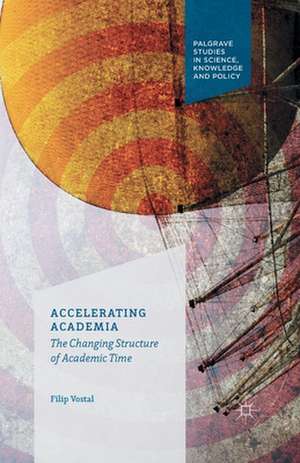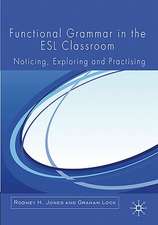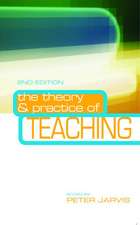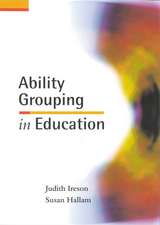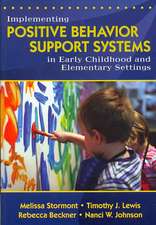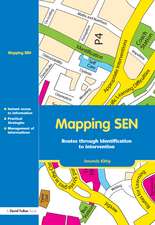Accelerating Academia: The Changing Structure of Academic Time
Autor F. Vostalen Limba Engleză Paperback – 28 feb 2020
| Toate formatele și edițiile | Preț | Express |
|---|---|---|
| Paperback (1) | 987.53 lei 43-57 zile | |
| Palgrave Macmillan UK – 28 feb 2020 | 987.53 lei 43-57 zile | |
| Hardback (1) | 992.57 lei 43-57 zile | |
| Palgrave Macmillan UK – 12 mar 2016 | 992.57 lei 43-57 zile |
Preț: 987.53 lei
Preț vechi: 1204.30 lei
-18% Nou
Puncte Express: 1481
Preț estimativ în valută:
189.13€ • 194.86$ • 158.43£
189.13€ • 194.86$ • 158.43£
Carte tipărită la comandă
Livrare economică 24 februarie-10 martie
Preluare comenzi: 021 569.72.76
Specificații
ISBN-13: 9781349692576
ISBN-10: 1349692573
Pagini: 242
Ilustrații: XI, 242 p.
Dimensiuni: 140 x 216 mm
Greutate: 0.3 kg
Ediția:1st ed. 2016
Editura: Palgrave Macmillan UK
Colecția Palgrave Macmillan
Locul publicării:London, United Kingdom
ISBN-10: 1349692573
Pagini: 242
Ilustrații: XI, 242 p.
Dimensiuni: 140 x 216 mm
Greutate: 0.3 kg
Ediția:1st ed. 2016
Editura: Palgrave Macmillan UK
Colecția Palgrave Macmillan
Locul publicării:London, United Kingdom
Cuprins
Introduction. The Pulse of Modern Academia
1. Thematizing Acceleration
2. Continuity and Change in the Temporal Dynamics of Capitalism
3. Vehicularity: The Idea of the Knowledge Economy
4. Performativity: Competitiveness and Excellence
5. Acceleration in the Academic Life-World
6. Fast Sites: Igniting and Catapulting Knowledge
7. Sociology, Fast and Slow
Conclusion. For a Temporal Autonomy of Academia
1. Thematizing Acceleration
2. Continuity and Change in the Temporal Dynamics of Capitalism
3. Vehicularity: The Idea of the Knowledge Economy
4. Performativity: Competitiveness and Excellence
5. Acceleration in the Academic Life-World
6. Fast Sites: Igniting and Catapulting Knowledge
7. Sociology, Fast and Slow
Conclusion. For a Temporal Autonomy of Academia
Recenzii
“The present-day university has become a hot topic in several sociology, anthropology and philosophy subfields. Filip Vostal’s debut monograph on the institutional transformations and subjective experiences of (social) scientists at universities is a welcome addition to the burgeoning interdisciplinary area of critical studies of science, higher education and academia.” (Milena Kremakova, International Studies in the Philosophy of Science, Vol. 31 (2), March, 2018)
“I recommend Vostal’s book highly. He gives us considered, inquiring reflections across a broad literature on neoliberalism and speed at universities, and is critical, fair and constructive. The empirical research is limited by the range of interviewees, but provides revealing information that brings a fuller picture and is the foundation for further research that is more inclusive. Vostal’s work is a basis for pursuing solutions and alternatives.” (Luke Martell, LSE Review of Books, blogs.lse.ac.uk, August, 2017)
“I recommend Vostal’s book highly. He gives us considered, inquiring reflections across a broad literature on neoliberalism and speed at universities, and is critical, fair and constructive. The empirical research is limited by the range of interviewees, but provides revealing information that brings a fuller picture and is the foundation for further research that is more inclusive. Vostal’s work is a basis for pursuing solutions and alternatives.” (Luke Martell, LSE Review of Books, blogs.lse.ac.uk, August, 2017)
Notă biografică
Filip Vostal is a Postdoctoral Researcher at the Centre for Science, Technology, and Society Studies at the Institute of Philosophy of the Czech Academy of Sciences, Czech Republic.
Textul de pe ultima copertă
The era of a 'slow-paced' academia characterized by leisurely tempos of research and pedagogy has gone. Academia is now an intensely social site, and the boundaries between capitalist dynamics and academic life have become blurred. Academic workloads are increasing as academics have to deal with an ever-growing number of tasks, information, obligations, texts, procedures and connections. Yet the time available for carrying out these activities remains relatively constant, and even seems to be decreasing. Simultaneously, the 'will to accelerate' has emerged as a significant cultural and structural force in knowledge production, propelled by competitiveness and the drive for excellence. Filip Vostal examines the changing character of academic time, and questions the nature of this acceleration. Without challenging its negative implications, Vostal argues that we cannot fully understand this phenomenon unless we scrutinize its positive dimensions, and ask why people opt for acceleration,and how and why the compulsion to accelerate features in higher education policy discourse.
